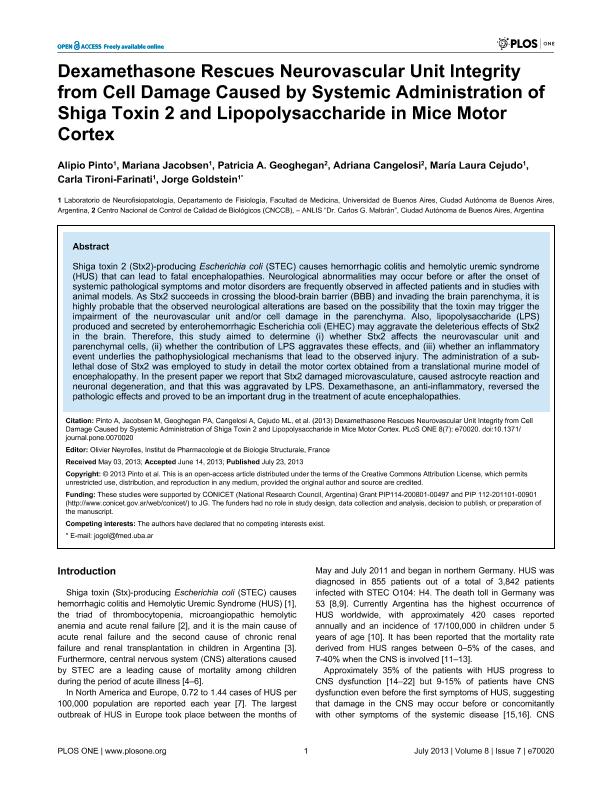Artículo
Dexamethasone Rescues Neurovascular Unit Integrity from Cell Damage Caused by Systemic Administration of Shiga Toxin 2 and Lipopolysaccharide in Mice Motor Cortex
Pinto, Alipio; Jacobsen, Mariana Elena; Geoghegan, Patricia; Cangelosi, Adriana; Cejudo, Maria Laura; Tironi-Farinati, Carla; Goldstein Raij, Jorge

Fecha de publicación:
07/2013
Editorial:
Public Library of Science
Revista:
Plos One
ISSN:
1932-6203
Idioma:
Inglés
Tipo de recurso:
Artículo publicado
Clasificación temática:
Resumen
Shiga toxin 2 (Stx2)-producing Escherichia coli (STEC) causes hemorrhagic colitis and hemolytic uremic syndrome (HUS) that can lead to fatal encephalopathies. Neurological abnormalities may occur before or after the onset of systemic pathological symptoms and motor disorders are frequently observed in affected patients and in studies with animal models. As Stx2 succeeds in crossing the blood-brain barrier (BBB) and invading the brain parenchyma, it is highly probable that the observed neurological alterations are based on the possibility that the toxin may trigger the impairment of the neurovascular unit and/or cell damage in the parenchyma. Also, lipopolysaccharide (LPS) produced and secreted by enterohemorrhagic Escherichia coli (EHEC) may aggravate the deleterious effects of Stx2 in the brain. Therefore, this study aimed to determine (i) whether Stx2 affects the neurovascular unit and parenchymal cells, (ii) whether the contribution of LPS aggravates these effects, and (iii) whether an inflammatory event underlies the pathophysiological mechanisms that lead to the observed injury. The administration of a sublethal dose of Stx2 was employed to study in detail the motor cortex obtained from a translational murine model of encephalopathy. In the present paper we report that Stx2 damaged microvasculature, caused astrocyte reaction and neuronal degeneration, and that this was aggravated by LPS. Dexamethasone, an anti-inflammatory, reversed the pathologic effects and proved to be an important drug in the treatment of acute encephalopathies.
Archivos asociados
Licencia
Identificadores
Colecciones
Articulos(OCA HOUSSAY)
Articulos de OFICINA DE COORDINACION ADMINISTRATIVA HOUSSAY
Articulos de OFICINA DE COORDINACION ADMINISTRATIVA HOUSSAY
Citación
Pinto, Alipio; Jacobsen, Mariana Elena; Geoghegan, Patricia; Cangelosi, Adriana; Cejudo, Maria Laura; et al.; Dexamethasone Rescues Neurovascular Unit Integrity from Cell Damage Caused by Systemic Administration of Shiga Toxin 2 and Lipopolysaccharide in Mice Motor Cortex; Public Library of Science; Plos One; 8; 7; 7-2013; 1-14
Compartir
Altmétricas



